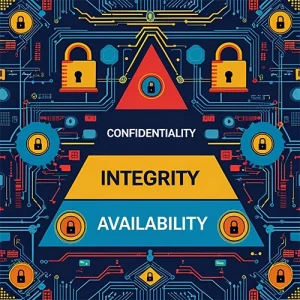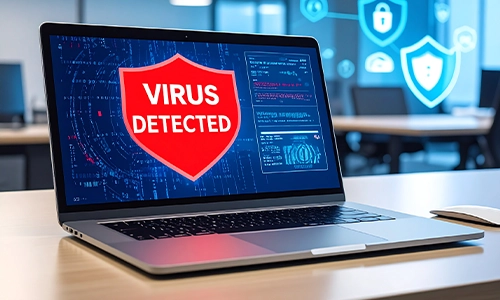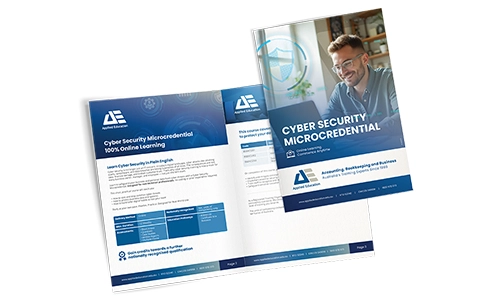
Published: July 2025
Digital scams and cyber attacks have been prominent in this digital age— it’s important to recognise these more than ever. These don’t only affect individuals, but also businesses and organisation. These threats are rapidly growing, and so is the demand for cyber security.
Whether you're an individual looking to upskill or a small business owner wanting to strengthen your digital defences, this blog breaks down what cyber security is, what you’ll learn in ou rcourses and how to get started in 2025 — with a flexible micro-credential course available across Australia, and a fee-free training in WA.
Table of Contents
What is Cyber Security and Why is it Important?
Cyber security refers to the practice of protecting digital data and information, networks, and computers from attacks, damage, or unauthorised access. In simple words, it’s basically the defence system of the internet to prevent hackers from stealing personal information, disrupting business, or damaging government infrastructure.
The digital landscape continuously evolves, and it makes us all more connected through online banking, remote work, smart devices, and cloud platforms, hence the risk of cyber threats.

The 4 Most Common Types of Cyber Security
Cyber security is a broad field with several areas of specialisation. Understanding the five key types helps build a strong foundation for individuals and businesses:
Application Security - Secures software and apps during development and after deployment.
Network Security - Focuses on protecting internal networks (LANs, WANs) from unauthorised access or misuse.
Cloud Security - Protects systems, data, and infrastructure hosted on cloud platforms like AWS, Azure, Google Cloud.
Endpoint Security - Secures individual devices like laptops, desktops, phones, etc., that connect to networks. This includes endpoint protection tools such as antivirus software, which helps detect and block malware, ransomware, and other malicious threats.
Have You Heard of the CIA Triad?
The CIA Triad is a core concept in cyber security, standing for Confidentiality, Integrity, and Availability. These three principles form the foundation of secure systems:
Confidentiality - Ensures information is only accessible to authorised users.
Integrity - Keeps data accurate and unaltered.
Availability - Ensures systems and data are accessible when needed.
Mastering the CIA Triad is essential for anyone working in the cyber field — and it's a key concept you’ll learn in your training at Applied Education.

Common Types of Cyber Attacks You Need to Know
Cyber attacks are becoming increasingly sophisticated, targeting critical infrastructure of individuals, businesses, and organisations alike. Understanding the different types of attacks is the first step in protecting your data and devices.
Malware & Ransomware - Malicious software that can damage systems or lock your files for ransom.
Social Engineering and Phishing - Designed to steal confidential information through fake emails, texts, or phone calls.
Man-in-the-Middle (MitM) Attack - MitM happens when a hacker secretly intercepts and possibly alters the communication between two people, devices, or systems — without either party knowing.
Imagine you're sending a private message to a friend, but someone is sitting in between, reading or even changing that message before it gets to your friend.
Denial-of-Service Attack - Aims to shut down computer systems, network, or website by overwhelming it with excessive traffic or requests. This overload prevents real users from accessing the service — essentially making it crash or freeze.
Zero-day Exploit - A Zero-Day Exploit is a cyber attack that takes advantage of a vulnerability in software or hardware that the developers don’t know about yet.
For example, a hacker finds a hidden flaw in your phone’s operating system and uses it to install spyware — before Apple or Google even knows the flaw exists.
Password Attack - These involve hackers gaining access by guessing or stealing your password.
Internet of Things Attack - The Internet of Things (IoT) refers to everyday devices connected to the internet, like:
- Smart TVs
- Smart thermostats
- Wearable fitness trackers
- Home security systems
- Industrial sensors
- Injection Attack
In these security threats, hackers "inject" malicious code into a vulnerable system (usually a form or search bar on a website). If the system doesn’t properly filter input, the hacker can:
- Access or steal data
- Delete or modify databases
- Gain full control over the system
If you want to learn more about these types of cyber attacks and how to protect against them, you can check out our full blog on cyber security attacks.

Advantages and Disadvantages of Cyber Security
Cyber security offers many benefits, but like any field, it has its challenges. Digital information security is the practice of protecting data from security breach, ensuring the confidentiality, integrity, and availability of sensitive information.
Advantages:
- Protects sensitive information and systems
- Prevents financial loss
- Prevent unauthorised access and data breaches
- Builds trust with customers and users
- Opens up high-demand career opportunities
Disadvantages:
- Can require ongoing investment in tools and training
- Systems may become complex to manage
- New threats constantly emerge, requiring regular updates
Despite the challenges, the advantages of strong cyber security operations far outweigh the risks — and qualified professionals are key to success.
How to Get into Cyber Security?
You don’t need a tech background to start a career in cyber security. Here’s how to get started:
- Take a beginner-friendly course – our Cyber Security courses are designed for businesses, beginners, individuals looking to upskill, and small business owners.
- Build foundational IT skills – Learn networking, systems, and basic coding.
- Practice using real-world tools – Through simulated environments and hands-on training.
- Earn certifications – Enhance your resume with industry credentials.
With flexible learning options and supportive trainers, Applied Education helps you take the first step with confidence. We have also prepared a more detailed guide on how to get into cyber security for you.
WA Fee-free Cyber Security Course
If you're a Western Australia resident, you may be eligible for fee-free cyber security training in 2025. Delivered by Applied Education under the WA Government's initiative, this course gives you access to industry-relevant skills without the cost barrier. Check your eligibility to find out if you meet the entry requirements.
Fully funded by WA Government Department of Training and Workforce Development, see jobsandskills.wa.gov.au. Includes all learning materials & access to student support. National recognised units.
This course is conducted via a combination of face-to-face and online learning, with 4 face-to-face classes which run from 8:30 AM to 4:30 PM. Our classes are held at Applied Education, Level 1, 524 Hay Street, WA 6000, located close to Perth Train Station.
Cyber Security Course Online – Micro-credential
Applied Education also offers flexible online micro-credentials in cyber security — ideal for working professionals or anyone looking to upskill quickly.
- Learn at your own pace
- Gain job-ready skills
- Earn a recognised units
These short courses focus on practical, high-impact topics like threat detection, risk management, and ethical hacking—perfect for building your cyber knowledge without a long-term commitment.

Take the Next Step – Enrol at Applied Education
Cyber security is more than a career — it’s a vital skillset for today’s connected world. Whether you’re just getting started or looking to grow your expertise, Applied Education offers practical, accessible training tailored to your goals.
With more than two decades of experience, Applied Education has become a leading name in delivering nationally accredited training and short courses across Australia. Our flexible online learning model and experienced educators have supported thousands of learners in gaining practical, career-focused skills.
We prioritise real-world results, uphold industry best practices, and are dedicated to making education accessible, making us a trusted choice for both individuals and organisations seeking quality training.


